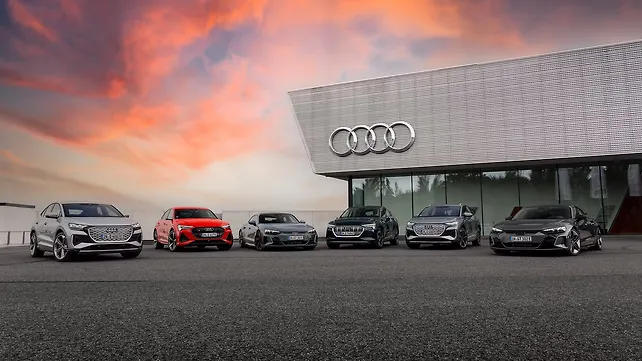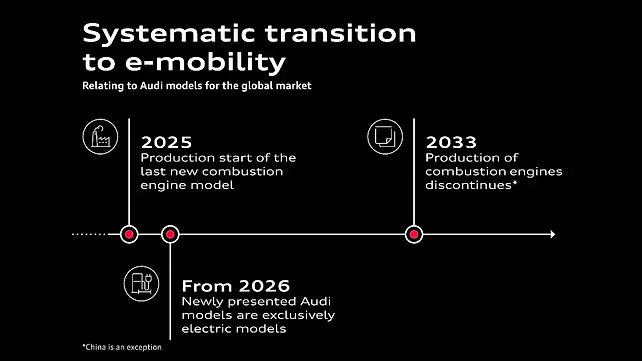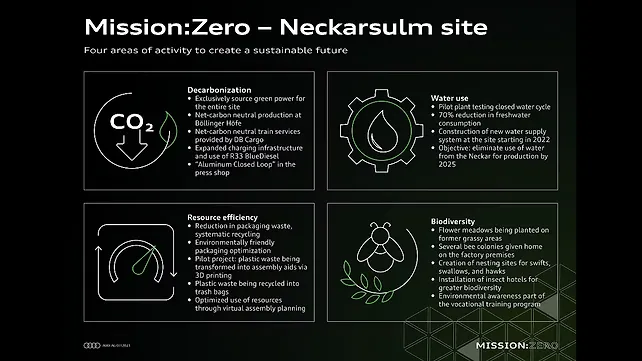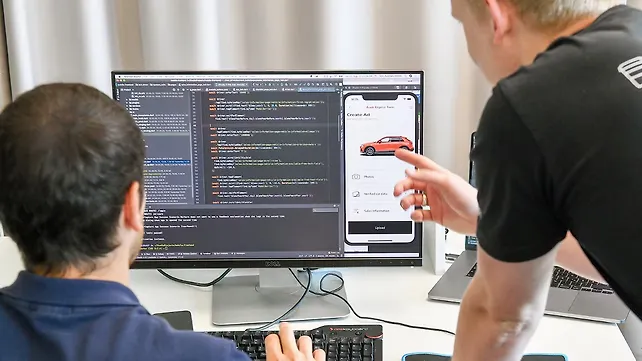
Premium German automaker Audi is making a gradual but surefooted transition to sustainable mobility with a slew of recent decisions accelerating that transition.
Riding on the company’s recent announcement that starting 2026, it would only launch new models on the global market that are equipped with electric drive systems, Audi has now announced its new corporate strategy ‘Vorsprung 2030’ – a direction that would remain viable long into the future, in the words of Markus Duesmann, CEO, Audi.
Audi wants to offer its electric vehicle customers an unparalleled on-board system with its own ecosystem. On the other hand, a couple of weeks back, Audi announced it would gradually phase out production of its internal combustion engines between now and 2033. This decision is clearly in line with its ambition to become a sustainable, social, and technological leader by the end of this decade.
From “Vorsprung durch Technik” (Progress Through Technology) to “Vorsprung 2030”, Audi’s future strategy with regards to e-mobility is now firmly in place. Duesmann believes ‘Vorsprung durch Technik’ will remain necessary because “we can only solve many of the world’s major problems, such as carbon emissions and global warming, through the use of clean technologies. We view ourselves as a company that guarantees the freedom and individual mobility of our customers.”
He stressed on the fact that any technology developed must be consequential and effective in keeping the world moving. Audi’s focus on zero-emission drive systems is a case in point.

Decoding “Vorsprung 2030” strategy
For half a century, “Vorsprung durch Technik” has defined Audi’s DNA. Silja Pieh, Chief Strategist, Audi had her task cut out to ensure this DNA doesn’t change, while creating a new sustainable and forward-looking corporate strategy for the company.
With around 500 Audi employees from across hierarchical levels and from major markets such as China and the United States, Pieh spent months analysing more than 600 global trends in the mobility sector through 2030 that could become relevant to the company.
The team gathered insights that were discussed and evaluated in depth together with the Board of Management. Some of the insights are obvious – sales and profits will gradually shift, for example, initially from ICE vehicles to EVs, and later, when autonomous driving offers additional growth potential, to software and services.
Another key focus is to strongly differentiate Audi’s all-electric vehicles from the competition through quality and design as well as increasing the added value for customers – including a seamless ecosystem for electric and autonomous driving. These changes will bring Audi closer and in more frequent contact with their customers in the future, with new digital and physical offerings, said John Newman, Head of Digitalisation, Audi.
Deeply committed to the issue of sustainability, Audi wants to further emphasise responsible business practices in the future and rigorously adhere to them. The new strategy focuses on profitable growth and differentiation – and provides guidelines for prioritising strategic areas of activity, including employee training, Audi’s corporate culture, and a new corporate management system all working in tandem.

The other area Audi is deeply focussed on is ESG. The company will closely align business success with sustainable activities on the basis of environmental, social, and governance (ESG) criteria, such as climate change mitigation and the protection of finite resources, occupational health and safety, social responsibility, and corporate governance practices related to compliance and risk management.
“The world and especially the transportation sector are rapidly evolving. We will respond to changes even more quickly and with greater flexibility in the future,” Pieh said. Audi will regularly analyse and, if necessary, refine its strategic framework.
In July this year, the Volkswagen Group had redefined its priorities with its NEW AUTO strategy. Audi’s “Vorsprung 2030” strategy is in total sync with that strategy. In fact, the advantage of this strategic vision is that it allows all of the company’s employees to focus on the upcoming challenges – both within the brand and across the entire brand group with Bentley, Lamborghini, Ducati, and Italdesign, said Martin Primus, General Secretary, AUDI AG.
Ideas for the future
Talking of future technological innovations, Oliver Hoffmann, Member of the Board of Management for Technical Development, Audi said, “In the age of new mobility, we not only define “Vorsprung” as world-class engineering, state-of-the-art design, and a captivating digital experience. We don’t just think in terms of vehicles. In the future, the focus will increasingly be on holistic mobility solutions, including the surrounding infrastructure.”
Through the “Audi DNA” project, the company is taking a deep dive into technical details such as steering angle requirements, hand torque, and acoustics in order to develop a one-of-a-kind Audi feel for its customers. In the future, Audi will be very explicit in its definition of what driving an Audi should feel like. “This also applies to highly automated driving, by the way,” Hoffmann noted.
From a technology standpoint, Audi believes the auto industry is faced with the most challenging decade in its history. This includes the steadily increasing focus on software in the vehicles and autonomous driving. Alongside e-mobility, focal points of the Volkswagen Group’s strategy include enhancing connectivity, digital services, and expanding the use of internally programmed systems.
Hoffmann said Audis of the future will be even more customer-centric, individualised, and sustainable thanks to intelligent hardware offered through its after-sales business.

CARIAD, an automotive software company that bundles together Volkswagen Group's software competencies and further expands them, is going to be a key component of Audi’s 2030 strategy. CARIAD will develop a scalable software platform with a standardised operating system and cloud connectivity for all Volkswagen Group brands by 2025.
“The E32.0 software platform will serve as the enabler of the synergies and innovations of the future, including autonomous driving,” explained Duesmann. While CARIAD is responsible for the technical implementation of software-based solutions, integrating them into the vehicle will be carried out by the respective brands in coordination with CARIAD.
Simultaneously, there is strong focus on building an efficient manufacturing processes and smart technologies in production. IT solutions and input from technology partners such as Amazon Web Services, SAP, and Capgemini are being incorporated into the Industry 4.0 project to create a fully connected factory at Audi’s Neckarsulm site.